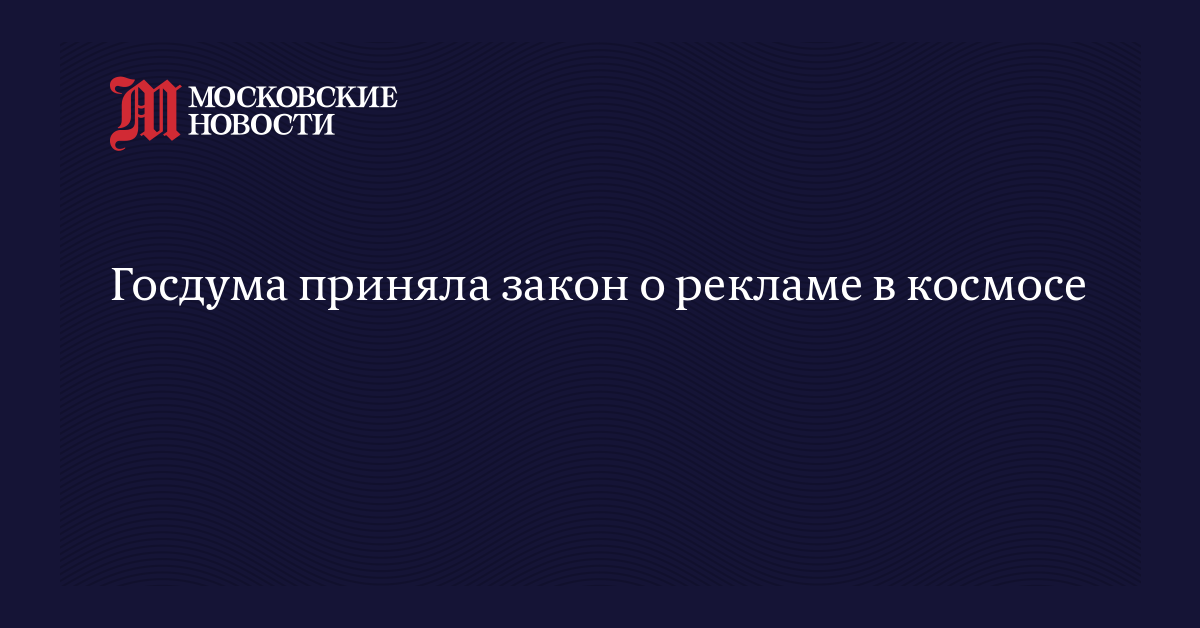According to the document, the state corporation Roscosmos will promote and conduct advertising campaigns, including the installation and operation of outdoor advertising on space infrastructure facilities and equipment. The law is set to come into force on January 1, 2026.
- The explanatory note to the bill states that potential clients for these services could be Russian banks and insurance companies. It is expected that organizations will participate in developing the names of spacecraft. This, according to the document’s assessment, could become an additional source of income.
- The bill was first submitted for consideration in November 2023. At that time, Roscosmos conducted a study of potential demand and confirmed the interest of large companies.
How Companies Will Be Able to Advertise in Orbit
Businesses will be able to place advertisements on spacecraft, including satellites, as well as on launch vehicles. The explanatory note to the bill also proposes splitting the profit from space advertising equally. One part will be allocated to the federal budget as non-tax revenue, and the second will form special reserve funds of Roscosmos.
According to the state corporation’s estimate, potential income from such projects could reach up to 200 million rubles annually from advertising on space equipment and up to 5 million from the installation or operation of outdoor advertising on space infrastructure facilities.
What Kind of Advertising Has Been Placed in Space
- In 1990, the Japanese television company TBS sponsored journalist Toyohiro Akiyama’s flight to the Mir station and placed its logo on the launch vehicle.
- In 1996, cosmonauts performing a spacewalk from the Mir station deployed a meter-long replica of a Pepsi-Cola can.
- In 2001, on the fairing of the launch vehicle delivering the Russian Zvezda module to the International Space Station (ISS), a three-meter image of the Pizza Hut logo was placed.
In 2021, Roscosmos placed a banner on a launch vehicle, and the space station crew congratulated Sberbank of Russia on its 180th anniversary in a live television broadcast from orbit.
Mir station
Mir was a Soviet/Russian space station that operated in low Earth orbit from 1986 to 2001. It was the first modular space station and served as a microgravity research laboratory where crews conducted scientific experiments. The station is famous for its long-term habitation, setting a record for the longest continuous human presence in space at the time.
International Space Station (ISS)
The International Space Station (ISS) is a habitable artificial satellite and modular space station in low Earth orbit, representing one of the most ambitious international cooperation projects in history. Its construction began in 1998 through a partnership between the space agencies of the United States (NASA), Russia (Roscosmos), Japan (JAXA), Europe (ESA), and Canada (CSA). It serves as a microgravity and space environment research laboratory where scientific research is conducted in astrobiology, astronomy, meteorology, and physics.
Zvezda module
The Zvezda module is the Russian-built service module of the International Space Station (ISS), launched and docked in 2000. It provides the station’s early living quarters and life support systems, and its design is derived from the earlier Mir space station. It remains a critical hub for station control and a docking port for Russian spacecraft.
Roscosmos
Roscosmos is the Russian state corporation responsible for spaceflight activities, cosmonautics programs, and aerospace research. It is the successor to the Soviet space program, which famously launched the first satellite, Sputnik 1, and the first human, Yuri Gagarin, into space. Today, it manages Russia’s civilian space activities and is a major partner in the International Space Station.
Sberbank of Russia
Sberbank is Russia’s largest and oldest banking institution, founded in 1841 by an order of Emperor Nicholas I to provide savings services to the general public. Originally called the State Savings Bank of the Russian Empire, it was fully state-owned for most of its history before undergoing privatization in the 1990s. Today, it is a publicly traded financial and technology conglomerate that remains a dominant pillar of the Russian financial system.
Pepsi-Cola
Pepsi-Cola is a globally recognized carbonated soft drink brand created in 1893 by Caleb Bradham, a pharmacist from New Bern, North Carolina. It was originally marketed as “Brad’s Drink” and was intended as a digestive aid before being renamed Pepsi-Cola in 1898. Today, it is one of the world’s most valuable brands and a major competitor in the beverage industry.
Pizza Hut
Pizza Hut is an American multinational restaurant chain and international franchise founded in 1958 by Dan and Frank Carney in Wichita, Kansas. It is known for its Italian-American menu, including pizza and pasta, and became a symbol of globalized American fast food culture as it expanded worldwide.
TBS
TBS (Tokyo Broadcasting System Television) is a major Japanese television network founded in 1951 as a radio broadcaster before launching its television service in 1955. It is one of the key stations in the Tokyo area and is renowned for producing popular news programs, dramas, and wide-show variety entertainment.





